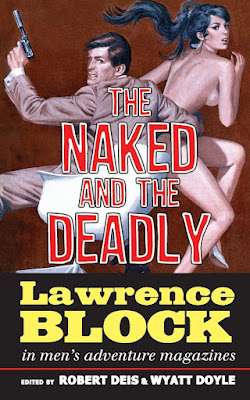The good people at The Men’s Adventure Library have compiled a collection of short stories and articles by Lawrence Block originally printed in Men’s Adventure Magazines. The collection is called The Naked and the Deadly, and it collects his magazine writings between 1958 and 1968. The mass-market paperback edition has a dozen stories, and the hardcover adds color art, explanatory materials and a bonus story from 1974. The introduction by Block explains how these articles and stories came to be. While working at the Scott Meredith agency, men’s publications would regularly call and say, “I need a 2,500-word article about a guy who survives a shipwreck,” and Block would make it happen. Trust me, it’s better when Block explains it. Bottom line: Don’t skip the intro.
Some of the stories included will be familiar to long-time Blockheads. “Great Istanbul Land Grab” and “Bring on the Girls” are extracts from existing Block novels starring his sleepless adventurer Evan Tanner. There are also three novellas starring his private detective Ed London previously reprinted in Block’s collection, One Night Stands and Lost Weekends. Puzzlingly, the book also includes a story attributed to Block’s pseudonym Sheldon Lord called “Queen of the Clipper Ships” that the author claims he didn’t write. Honestly, I don’t know why it was included in a Lawrence Block story collection at all.
Reviews of story compilations can be ponderous, so I sampled four selections for commentary:
“The Greatest Ship Disaster in American History” (Real Men, April 1958)
This is an article about an actual steamship called The General Slocum in 1904 that sailed from NYC on the East River with passengers destined for a church picnic downstream. Poor judgement results in an onboard fire that ended 1,000 passenger lives. It was a real disaster that Block brings alive in his pseudo-historical account
Block leans into his amplified version of events vividly underscoring descriptions of the burning flesh of the children on board. It’s a vivid nightmare of how human negligence can lead to mass casualties.
“She Doesn’t Want You” (Real Men, June 1958)
This is an allegedly non-fiction journalistic article about the inner-workings of the call-girl trade with the big revelation that a lot of these prostitutes are just doing it for the money and are secretly lesbians.
These faux investigative journalism pieces are hilarious in hindsight. Included are fake interviews with hookers who were perfectly straight before “the life” made them hate men and go lesbo. Block is a fun tour-guide for this silly expose that was probably pretty shocking at the time. Now it’s just funny.
“Killers All Around Me” (All Man, September 1961)
A staple of Men’s Adventure Magazines was the completely-fabricated first-person account of an experience that the magazine falsely claims is an authentic story. In this one, Block poses as C.C. Jones, allegedly telling the story of his job in the violent ward of an insane asylum.
He describes some of the crimes that landed the patients in the ward in graphic, grisly detail. He also describes the physical attacks he’s forced to ensure from the lunatics in the hospital. As always, it’s a well-written fake-expose from the author.
“Just Window Shopping” (Man’s Magazine, December 1962)
This is a straight-up fiction short story previously reprinted in One Night Stands and Lost Weekends about a Peeping Tom who likes to watch the ladies undress through their windows.
One night, he’s watching the hottest chick ever and she catches him. The reception he receives is quite unexpected. This is a nasty little story in line with the kind of stuff we used to see in Manhunt Magazine. Nothing fancy, but a sexy bit of noir worth reading.
-------------------------------------
Paperback Warrior Assessment:
Hardcore fans of Lawrence Block will enjoy this collection of his obscure oddities. It’s worth the purchase for the Ed London stories alone, if you don’t have them elsewhere. The faux journalism articles written by Block are plenty entertaining, but shouldn’t be conflated with his short mystery works.
If you’re a student of Men’s Adventure Magazine history and want the visceral experience of looking at the vivid art accompanying these articles and stories, go ahead and spring for the hardcover. The art extras and magazine commentary from the editors are a fascinating look back at this niche publishing phenomenon.
Overall, this collection from a mystery grandmaster is an easy recommendation. If you’re on the fence, take the plunge.
To get a copy of this book, click HERE.



















